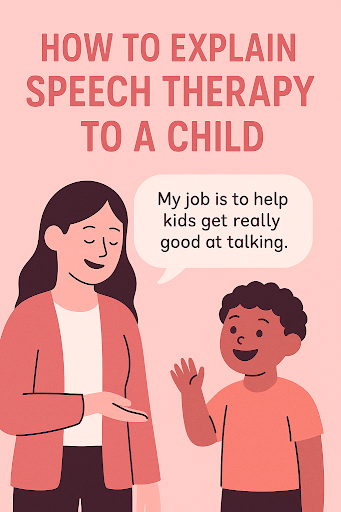How to Explain Speech Therapy to a Child
Age-appropriate ways to help children understand and feel comfortable with speech therapy services

You've got a new client on your caseload. They're 4, maybe 6, maybe 9. Their parent brings them in and says, "They don't know why they're here. Can you explain it?"
Cue the awkward pause.
As SLPs, we spend hours preparing evaluation reports, explaining findings to adults, and writing beautiful treatment plans. But when it comes to explaining therapy to the actual child, things can get murky.
What should we say? What shouldn't we say? How much do they need to know?
This article walks through how to explain speech therapy to children in a way that is:
- Honest and age-appropriate
- Empowering, not pathologizing
- Clear, kind, and simple
Why It Matters
Kids can feel confused, scared, or even ashamed if they don't understand why they're in therapy. Without context, they may think:
- "I'm in trouble."
- "Something's wrong with me."
- "Why do I have to come here and my friends don't?"
Your first few minutes set the tone. When children understand why they're coming, they're more likely to:
- Engage in activities
- Build trust with you
- Feel proud of their progress
Start with a Feel-Good Foundation
Begin with something neutral and friendly:
"My job is to help kids get really good at talking and understanding."
Or:
"This is a place where we play games that help your words get stronger."
The goal is to normalize therapy as something fun, helpful, and safe — not a punishment or correction.
Adapt to Age and Personality
For Toddlers & Preschoolers (2–4):
- Use very simple language
- Keep explanations playful
- Show, don't tell
"We're going to play talking games! Like making animal sounds and pointing to pictures."
Let your energy be your message.
For Young Kids (5–7):
- Focus on empowerment
- Use analogies
"Your brain is learning new ways to help your words come out clearly. We're going to practice together like a team."
You can even say:
"We're helping your words get superpowers."
For Older Kids (8–12):
- Give more context if they ask
- Let them help set goals
"You're already really smart — we're just helping your brain and mouth work better together when you talk, explain, or ask for things."
Let them feel agency in their own growth.
Normalize Differences
Kids are wired to compare. Help them understand that therapy is like:
- Tutoring for speech
- Practice for your talking muscles
- A coach for your brain
You can say:
"Just like some kids have glasses to help their eyes, you're getting a helper for your words."
Answer Questions Honestly (and Lightly)
If they ask:
"Why do I need this?" → "Because everyone learns differently, and this will help you feel more confident when you talk."
"Is something wrong with me?" → "Not at all. This just helps things feel a little easier."
"Will I come here forever?" → "Nope! We'll practice until you don't need me anymore."
Never lie — but don't over-explain. Simplicity is your superpower.
Involve the Child in Goal-Setting
Even at age 4, kids love having a say:
- "What's something you want to get better at?"
- "Do you want to talk more clearly? Remember things easier? Tell stories better?"
Letting them choose a sticker, a game, or even a "talking goal" gives them ownership and reduces resistance.
How SLP Score Can Support the Conversation
SLP Score is designed to help SLPs focus more on the child — and less on paperwork. When you spend less time writing reports, you have more time to:
- Build trust
- Create routines
- Plan kid-friendly therapy moments
Plus, with clean narrative summaries, you can generate caregiver-facing language that explains the "why" of therapy — which you can adapt directly for the child.
Ready to Focus More on Kids and Less on Paperwork?
Speech therapy should never feel scary. Help kids understand why they're here — and let SLP Score help you focus on what matters.
Start Here →